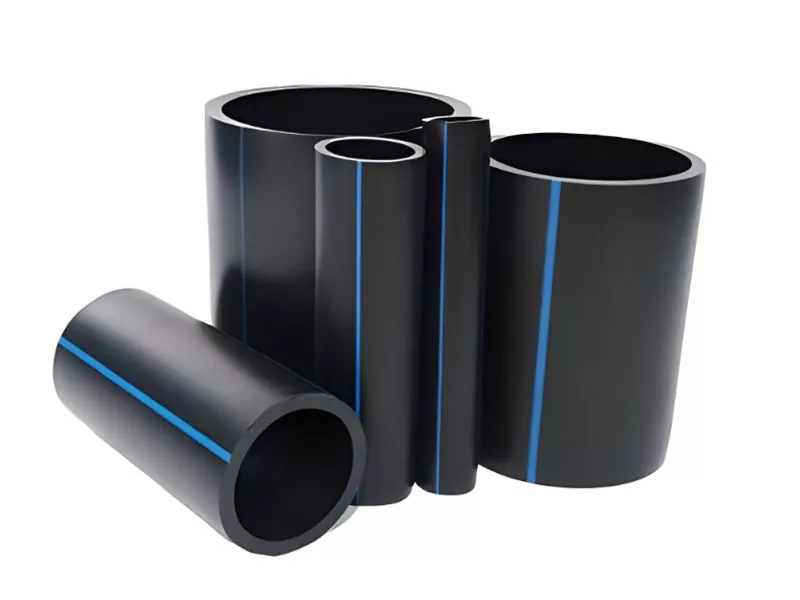Comprehending the Key Advantages of HDPE Pipeline for Water and Wastewater Administration
The usage of HDPE pipeline in water and wastewater management provides many advantages that merit consideration. Its phenomenal sturdiness and long lifespan make it a recommended selection for several jobs. In addition, the product's resistance to rust and chemical damages boosts its integrity in different atmospheres. The benefits prolong past just durability and resistance. custom hdpe pipe manufacturing Midland TX. Discovering its cost-effectiveness and environmental effect exposes a lot more compelling factors for its extensive adoption in modern-day infrastructure
Extraordinary Durability and Durability

HDPE pipeline sticks out for its extraordinary longevity and longevity, making it a preferred option in water administration systems. Created from high-density polyethylene, these pipes can hold up against considerable stress and tension, guaranteeing trustworthy performance over time. Their robust nature allows them to withstand severe environmental problems, including temperature level variations and dirt movements, which can create various other materials to fall short.
The lifespan of HDPE pipelines usually surpasses 50 years, providing an economical option for municipalities and markets alike. Furthermore, the product's lightweight residential or commercial properties streamline installment, decreasing labor expenses and timeframes. This longevity decreases the need for constant repair work or replacements, even more improving its economic charm.
In water monitoring applications, the integrity of HDPE pipelines suggests less disturbances and improved service connection, making them integral to lasting facilities development. The combination of sturdiness and durability strengthens HDPE's duty as a keystone in efficient water administration services.

Resistance to Rust and Chemical Damage
While numerous products catch corrosion and chemical damage with time, HDPE pipelines display remarkable resistance, making them optimal for numerous water monitoring applications. This resilience originates from the molecular structure of high-density polyethylene, which is inherently non-reactive and does not wear away like metals or weaken from exposure to extreme chemicals. Consequently, HDPE is extremely reliable in environments with aggressive compounds, such as wastewater systems that might contain acids, bases, and natural solvents.
Furthermore, HDPE pipelines can endure ecological variables such as soil acidity and saline conditions, additionally improving their viability for varied applications (hdpe pipe fittings Midland TX). Their capability to keep structural integrity in time minimizes the risk of leaks and failures, which is important in ensuring the safety and security and reliability of water distribution and wastewater administration systems. The resistance to corrosion and chemical damage considerably contributes to the overall performance and long life of HDPE piping solutions.
Cost-Effectiveness and Financial Advantages
When thinking about the monetary implications of water management systems, the cost-effectiveness of HDPE pipelines ends up being apparent. These pipelines use reduced installation and maintenance prices contrasted to conventional products like steel or concrete. Their light-weight nature simplifies transport and setup, resulting in lowered labor costs. Additionally, HDPE pipelines display a lengthy life expectancy, usually surpassing 50 years, which converts to fewer substitutes and long-term financial savings.
The resistance of HDPE to rust and chemical damage decreases the demand for pricey repair services and replacements. The pipelines likewise support effective water circulation, reducing power prices connected with pumping systems. By reducing leaks and water loss, HDPE pipes add to considerable financial benefits for communities and markets alike. Generally, the initial financial investment in HDPE piping can yield significant economic returns over the life expectancy of the water monitoring system, making it a prudent option for lasting framework growth.
Environmental Sustainability and Reduced Impact

Versatility and Adaptability in Installment
Due to their one-of-a-kind residential properties, HDPE pipes offer impressive versatility and versatility in setup, making them appropriate for a variety of applications. Their light-weight nature permits less complicated handling leak in main water line to house and transportation, reducing labor costs and installment time. HDPE pipes can be bent and formed to fit different surfaces and task requirements, which is specifically valuable in challenging settings.
In addition, their resistance to rust and chemical damages permits for setup in varied settings without the need for specialized safety finishes. The ability to fuse joints creates a constant, leak-free system, enhancing the overall honesty and reliability of the setup. HDPE's flexibility also suits ground motion, minimizing the danger of damage in areas susceptible to shifting soil. Generally, these characteristics make HDPE pipelines not just functional yet likewise a favored selection for water and wastewater administration systems.
Frequently Asked Concerns
Exactly How Does HDPE Pipe Contrast to PVC in Water Management Applications?
HDPE pipeline uses remarkable flexibility, resistance to rust, and longevity compared to PVC. Its lighter weight helps with simpler installment, while its long life expectancy lowers replacement costs, making HDPE a favored selection in water management applications.
What Is the Lifespan of HDPE Water Lines Under Regular Problems?
Under typical conditions, HDPE pipes can have a life-span ranging from 50 to 100 years. Their durability and resistance to deterioration add to their lasting efficiency in various applications, making them a dependable choice for infrastructure.
Are HDPE Piping Recyclable After Their Life Span?
Yes, HDPE pipelines are recyclable after their service life. hdpe pipe suppliers Midland TX. They can be refined and repurposed right into brand-new items, substantially minimizing ecological impact and advertising sustainability within the industry, making them an environment-friendly choice for piping services
What Is the Setup Refine for HDPE Pipes?
The installation procedure for HDPE pipelines involves website preparation, trenching, pipeline combination or mechanical joining, backfilling, and pressure testing. Appropriate techniques guarantee a resilient and efficient system for transferring water and wastewater successfully.
Can HDPE Water Lines Be Used for Both Potable and Non-Potable Water Solutions?
Yes, HDPE pipelines can pipe line be utilized for both drinkable and non-potable water systems. Their adaptability, sturdiness, and resistance to rust make them ideal for different applications, ensuring safe and efficient transport of water in various contexts.